- Home
- Neil Gaiman
Neverwhere Page 16
Neverwhere Read online
Page 16
“They were just winding us up,” said Door. “Trying to upset us.”
“Doing a bloody good job of it, too,” said Richard. And they walked through the open door, and then they were in the British Museum.
Mr. Vandemar was hungry, so they walked back through Trafalgar Square.
“Scare her,” muttered Mr. Croup, disgustedly. “Scare her. That we should be brought to this.”
Mr. Vandemar had found half a shrimp and lettuce sandwich in a garbage can, and was gently tearing it into small pieces, which he was tossing down onto the flagstones in front of him, attracting a small flock of hungry late-night pigeons. “Should have followed my idea,” said Mr. Vandemar. “Would have scared her lots more if I’d pulled his head off while she wasn’t looking, then put my hand up through his throat and wiggled my fingers about. They always scream,” he confided, “when the eyeballs fall out.” He demonstrated with his right hand.
Mr. Croup was having none of it. “Why get so squeamish at this stage in the game?” he asked.
“I’m not squeamish, Mister Croup,” said Mr. Vandemar. “I like it when the eyeballs fall out. Peepers and tarriwags.” More gray pigeons strutted over to peck at the fragments of bread and shrimp, and to disregard the lettuce.
“Not you,” said Mr. Croup. “The boss. Kill her, kidnap her, scare her. Why doesn’t he make up his mind?”
Mr. Vandemar ran out of the sandwich he had been using as bait, and now he made a dash into the crowd of pigeons, who took to the wing with some clacking noises and the occasional grumbling coo. “Well caught, Mister Vandemar,” said Mr. Croup, approvingly. Mr. Vandemar was holding a surprised and upset pigeon, which grumbled and fidgeted in his grasp and pecked ineffectively at his fingers.
Mr. Croup sighed, dramatically. “Well, anyway. We’ve certainly put the cat amongst the pigeons now,” he said, with relish. Mr. Vandemar held the pigeon up to his face. There was a crunching noise, as he bit off its head and commenced to chew.
The security guards were directing the museum’s guests to a hallway that seemed to be functioning as some kind of holding area. Door ignored the guards entirely and set off into the museum halls with Richard trailing along behind her. They went through the Egyptian rooms, up several flights of back stairs, and into a room marked Early English.
“According to this scroll,” she said, “the Angelus is in this room somewhere.” Then Door looked down at her scroll some more and looked around the hall, more carefully. She made a face. “Tch,” she explained, and took off back down the stairs, the way they had come. Richard had an intense feeling of déjà vu, before realizing that, yes, of course this felt familiar: it was how he had spent his weekends in the Jessica days. Which were starting to seem, already, like things that had happened to someone else a long, long time ago.
“The Angelus wasn’t in that room, then?” asked Richard.
“No, it wasn’t there,” said Door, a little more fiercely than Richard felt the question had actually warranted.
“Oh,” he said. “I only wondered.” They went into another room. Richard wondered if he were starting to hallucinate. “I can hear music,” he said. It sounded like a string quartet.
“The party,” said Door.
Right. The people in the dinner jackets they had lined up with. No, the Angelus didn’t seem to be here either. Door walked into the next hall, and Richard trailed in her wake. He wished he could be of more use. “This Angelus,” he said. “What does it look like?”
For a moment he thought she was going to reprimand him simply for asking. But she stopped, rubbed her forehead. “This just says it’s got a picture of an angel on it. But it can’t be that hard to find. After all,” she added, hopefully, “how many things with angels on them are there here?”
Nine
Jessica was under a little pressure. She was worried, and nervous, and jittery. She had catalogued the collection, arranged with the British Museum to host the exhibition, organized the restoration of the prime exhibit, assisted in hanging and exhibiting the collection, and put together the list of invitees to the fabulous launch. It was just as well she didn’t have a boyfriend, she would tell her friends. There’d be no time for one even if she had one. Still, it would be nice, she thought, when she got a moment: someone to go to galleries with on the weekends. Someone to . . .
No. She did not go to that place in her head. She could no more pin it down than she could put her finger on a bead of mercury, and she refocused on the exhibition. Even now, at the last minute, there were so many things that could go wrong. Many a horse had fallen at the final hurdle. Many an overconfident general had seen certain victory turn to defeat in the closing minutes of a battle. Jessica was simply going to ensure that nothing went wrong. She was wearing a green silk dress, an off-the-shoulder general marshalling her troops and stoically pretending that Mr. Stockton was not half an hour late.
Her troops consisted of a head waiter, a dozen serving staff, three women from the caterers, a string quartet, and her assistant, a young man named Clarence.
She inspected the drinks table. “We’re fine for champagne? Yes?” The head waiter pointed to the crate of champagne beneath the table. “And sparkling mineral water?” Another nod. Another crate. Jessica pursed her lips. “What about plain mineral water? Bubbles aren’t everybody’s cup of tea, you know.” They had plenty of plain mineral water. Good.
The string quartet was warming up. They were not quite loud enough to drown the noise coming from the hallway outside. It was the noise of a small but affluent crowd: the grumbling of ladies in mink coats, and men, who, were it not for the NO SMOKING signs on the walls—and perhaps the advice of their doctors—would be smoking cigars; the grumbling of journalists and celebrities who could smell the canapés, vol-au-vents, sundry nibbles, and free champagne.
Clarence was talking to someone on his portable phone, a slimline piece of fold-out engineering that made the Star Trek communicators look bulky and old-fashioned. He turned it off, pushed down the antenna, put it into the Armani pocket of his Armani suit, where it did not even make a bulge. He smiled, reassuringly. “Jessica, Mister Stockton’s driver’s phoned from the car. They’re still running a couple of minutes late. Nothing to worry about.”
“Nothing to worry about,” echoed Jessica. Doomed. Doomed. The whole thing was going to be a disaster. Her disaster. She picked up a glass of champagne from the table, emptied it, and handed the empty glass to the wine waiter.
Clarence tipped his head on one side, listening to the grumbling reverberation from the hallway outside. The crowd wanted in. He looked at his watch, then looked at Jessica questioningly, a captain querying his general. Into the Valley of Death, then, boss?
“Mister Stockton is on his way, Clarence,” Jessica said, calmly. “He has requested a private viewing before the event begins.”
“Shall I go out and see how they’re doing?”
“No,” she said, decisively. Then, just as decisively, “Yes.” Food and drink dealt with, Jessica turned to the string quartet and asked them, for the third time that evening, exactly what they planned to play.
Clarence opened the double doors to check on the crowd. It was worse than he had thought: there had to be more than a hundred people in the hall. And they weren’t just people. They were People. Some of them were even Personalities.
“Excuse me,” said the chairman of the Arts Council. “The invitations said eight o’clock sharp. It’s twenty past eight already.”
“We’ll just be a few more minutes,” reassured Clarence, smoothly. “Security arrangements.”
A woman in a hat bore down on him. Her voice was stentorian, bullying, and decidedly parliamentary. “Young man,” she announced. “Do you know who I am?
“Not really, no,” lied Clarence, who knew exactly who all of them were. “Hold on—I’ll see if anyone in here does.” He shut the door behind him. “Jessica? They’re going to riot.”
“Don’t exaggerate, Clarence.” She was
moving around the room like a green silk whirlwind, positioning her serving staff, with their trays of canapés or drinks, in strategic corners of the hall; checking the public-address system, the podium, the curtain, and the pull-rope. “I can see the headlines now,” said Clarence, unfolding an imaginary newspaper. “ ‘Geritol Billionaires Crush Marketing Babe in Museum Canapé Dash Horror.’ ”
Somebody began knocking at the door. The volume in the hallway began to increase. Somebody was saying, very loudly, “Excuse me. Um. Excuse me.” Someone else was informing the crowd that it was a disgrace, quite simply a disgrace, no other word for it. “Executive decision,” said Clarence, suddenly. “I’m letting them in.”
Jessica shouted, “No! If you—”
But it was too late. The doors were open, and the horde was pushing its way into the hall. The expression on Jessica’s face morphed from one of horror to one of charmed delight. She shimmered toward the door. “Baroness,” she said, with a happy smile. “I can’t tell you how delighted we are that you were able to come to our little exhibition this evening. Mister Stockton’s been unavoidably delayed, but he’ll be here momentarily. Please, have some canapés . . .” Over the baroness’s mink-draped shoulder, Clarence winked at her, cheerfully. Jessica ran through all the bad words she knew in her head. As soon as the baroness had headed for the vol-au-vents, Jessica walked over to Clarence and, in a whisper, and still smiling, called him several of them.
Richard froze. A security guard was coming straight toward them, the beam of his flashlight flashing from side to side. Richard looked around for somewhere to hide.
Too late. Another guard was walking their way, past the huge statues of dead Greek gods, flashlight beam swinging. “All right?” called the first guard. The other guard kept coming, and stopped just beside Richard and Door.
“I suppose,” she said. “I’ve already had to stop a couple of idiots in suits from carving their initials on the Rosetta stone. I hate these functions.”
The first guard shone his flashlight straight into Richard’s eyes, then let the beam slide off, skittering over shadows. “I keep telling you,” he said, with the satisfied relish of any true prophet, “it’s The Masque of the Red Death all over again. A decadent elite party, while civilization crumbles about their ears.” He picked his nose, wiped it on the leather sole of his well-polished black boot.
The second guard sighed. “Thank you, Gerald. Right, back on patrol.”
The guards walked out of the hall together. “Last one of these events we found someone had puked in a sarcophagus,” said one of the guards, and then the door closed behind them.
“If you’re part of London Below,” said Door to Richard, in a conversational voice, as they walked, side by side, into the next hall, “they normally don’t even notice you exist unless you stop and talk to them. And even then, they forget you pretty quickly.”
“But I saw you,” said Richard. It had been bothering him for a while.
“I know,” said Door. “Isn’t that odd?”
“Everything’s odd,” said Richard, with feeling. The string music was getting louder. The surges of anxiety were somehow worse up here in London Above, where he was forced to reconcile these two universes. At least below, he could just proceed dreamlike, putting one foot in front of the other like a sleepwalker.
“The Angelus is through there,” announced Door, interrupting his reverie, pointing to the direction from which the music was coming.
“How do you know?”
“I know,” she said, with utter certainty. “Come on.” They stepped out of the darkness into a lighted corridor. There was a huge sign hanging across the corridor. It said:
ANGELS OVER ENGLAND
AN EXHIBITION AT THE BRITISH MUSEUM
Sponsored by Stocktons PLC
They crossed the corridor and walked through an open door, into a large room in which a party was going on.
There was a string quartet playing, and a number of serving staff were providing a roomful of well-dressed people with food and drink. There was a small stage in one corner of the room, with a podium on it, beside a high curtain.
The room was completely filled with angels.
There were statues of angels on tiny plinths. There were paintings of angels on the walls. There were angel frescoes. There were huge angels and tiny angels, stiff angels and amiable angels, angels with wings and haloes and angels with neither, warlike angels and peaceable angels. There were modern angels and classical angels. Hundreds upon hundreds of angels of every size and shape. Western angels, Middle Eastern angels, Eastern angels. Michelangelo angels. Joel Peter Witkin angels, Picasso angels, Warhol angels. Mr. Stockton’s angel collection was “indiscriminate to the point of trashiness, but certainly impressive in its eclecticism” (Time Out).
“Would you think,” Richard asked, “that I was being picky if I pointed out that trying to find something with an angel on it in here is going to be like trying to find a needle in an oh my God it’s Jessica.” Richard felt the blood drain from his face. Until now he had thought that that was simply a figure of speech. He hadn’t thought it actually happened in real life.
“Someone you knew?” asked Door.
Richard nodded. “She was my. Well. We were going to be married. We’ve been together for a couple of years. She was with me when I found you. She was the one on the. She left that message. On the answering machine.” He pointed across the room: Jessica was making animated conversation with Sir Andrew Lloyd Webber, Bob Geldof, and a bespectacled gentleman who looked suspiciously like a Saatchi. Every few minutes she checked her watch and glanced toward the door.
“Her?” said Door, recognizing the woman. Then, obviously feeling that she should say something nice about someone Richard had cared for, she said, “Well, she’s very . . .” and she paused, and thought, and then said, “. . . clean.”
Richard stared across the room. “Will she . . . is she going to be upset that we’re here?”
“I doubt it,” said Door. “Frankly, unless you do something stupid, like talk to her, she probably won’t even notice you.” And then, with more enthusiasm, she said, “Food!” She descended on the canapés like a small, smut-nosed girl in a too-large leather jacket who had not eaten properly for sometime. Enormous quantities of food were immediately crammed into her mouth, masticated and swallowed, while, at the same time, the more substantial sandwiches were wrapped in paper napkins and placed into her pockets. Then, with a paper plate heaped high with chicken legs, melon slices, mushroom vol-au-vents, caviar puffs, and small venison sausages, she began to circle the room, staring intently at each and every angelic artefact.
Richard trailed along behind her, with a Brie and fennel sandwich and a glass of freshly squeezed orange juice.
Jessica was deeply puzzled. She had noticed Richard, and having noticed him, she had noticed Door. There was something familiar about them both: it was like a tickle at the back of her throat, impossible to get rid of, utterly irritating.
It reminded Jessica of something her mother had once told her about, of how Jessica’s mother had, one evening, encountered a woman she had known all her life—had been to school with, had served on the parish council with—and how her mother, encountering the woman at a party, had suddenly realized that she was unable to recall the woman’s name, although she knew the woman had a husband in publishing named Eric and a golden retriever named Major. It had left Jessica’s mother quite disgruntled.
It was driving Jessica to distraction. “Who are those people?” she asked Clarence.
“Them? Well, he’s the new editor of Vogue, she’s the arts correspondent of the New York Times. The one between them is Kate Moss, I think . . .”
“No, not them,” said Jessica. “Them. There.”
Clarence looked in the place that she was pointing. Hm? Oh. Them. He couldn’t understand how he had failed to see them before. Old age, he thought; he would soon be twenty-three. “Journalists?” he said, without much convic
tion. “They do look rather trendoid. Grunge chic? Please. I know I invited The Face . . .”
“I know him,” said Jessica, frustrated. Then Mr. Stockton’s chauffeur phoned from Holborn to say that he was almost at the British Museum, and Richard slid out of her head, like mercury trickling through her fingers.
“See anything?” asked Richard.
Door shook her head and swallowed a mouthful of hastily chewed chicken leg. “It’s like playing ‘Spot the Pigeon’ in Trafalgar Square,” she said. “There’s nothing that feels like the Angelus. The paper said I’d know it if I saw it.” And she wandered off, inspecting angels, pushing her way past a Captain of Industry, the Deputy Leader of the Opposition, and the Highest-Paid Call Girl in the South of England.
Richard turned away and found himself face-to-face with Jessica. Her hair was piled on her head, and it framed her face perfectly in corkscrews of chestnut curls. She was very beautiful. She was smiling at him; it was the smile that did it. “Hello Jessica,” he said. “How are you?”
“Hello. You won’t believe this,” she said, “but my assistant failed to make a note of your newspaper, Mister uh.”
“Paper?” said Richard.
“Did I say newspaper?” said Jessica, with a tinkling, sweet, and self-deprecating laugh. “Magazine . . . television station. You are with the media?”
“You’re looking very fine, Jessica,” said Richard.
“You have the advantage of me,” she said, smiling roguishly.
“You’re Jessica Bartram. You’re a marketing executive at Stocktons. You’re twenty-six. Your birthday is April the twenty-third, and in the throes of extreme passion you have a tendency to hum the Monkees song ‘I’m a Believer’ . . .”

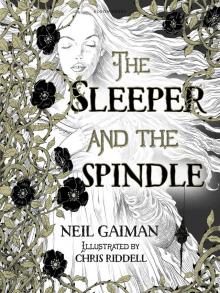 The Sleeper and the Spindle
The Sleeper and the Spindle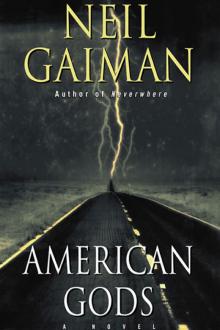 American Gods
American Gods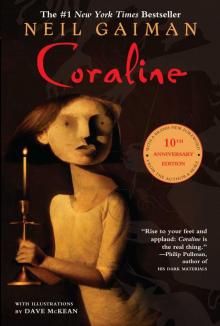 Coraline
Coraline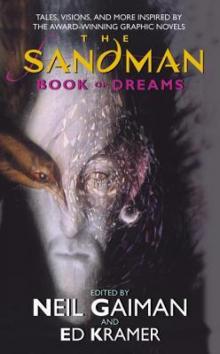 The Sandman: Book of Dreams
The Sandman: Book of Dreams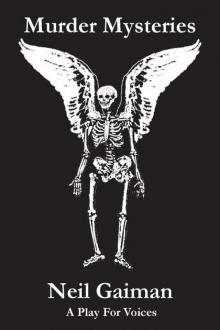 Murder Mysteries
Murder Mysteries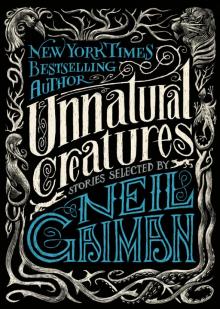 Unnatural Creatures
Unnatural Creatures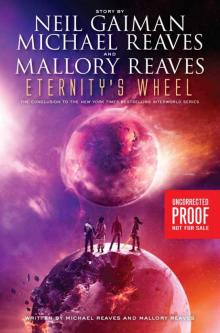 Eternity's Wheel
Eternity's Wheel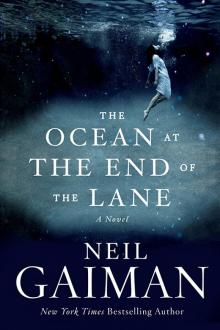 The Ocean at the End of the Lane
The Ocean at the End of the Lane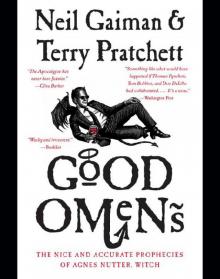 Good Omens
Good Omens Stardust
Stardust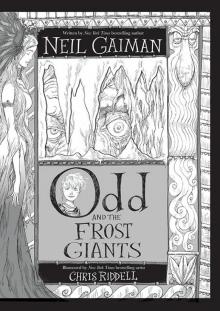 Odd and the Frost Giants
Odd and the Frost Giants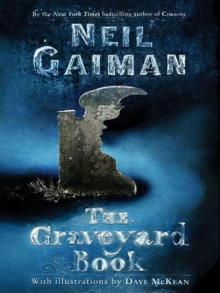 The Graveyard Book
The Graveyard Book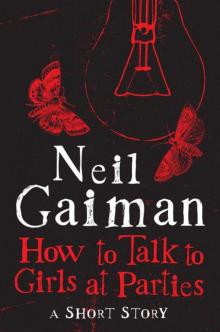 How to Talk to Girls at Parties
How to Talk to Girls at Parties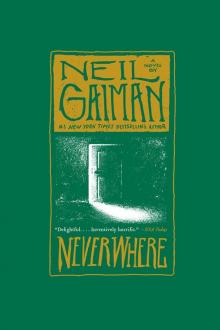 Neverwhere
Neverwhere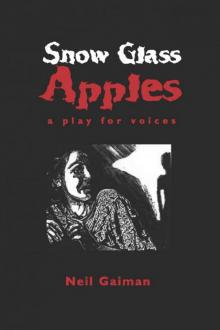 Snow, Glass, Apples
Snow, Glass, Apples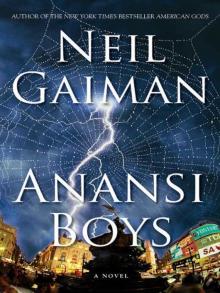 Anansi Boys
Anansi Boys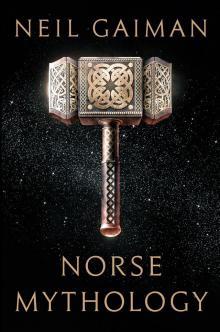 Norse Mythology
Norse Mythology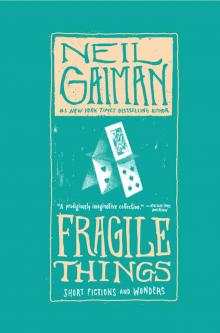 Fragile Things: Short Fictions and Wonders
Fragile Things: Short Fictions and Wonders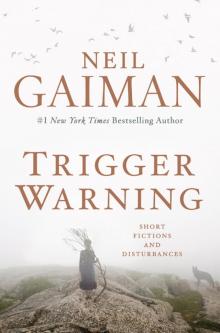 Trigger Warning: Short Fictions and Disturbances
Trigger Warning: Short Fictions and Disturbances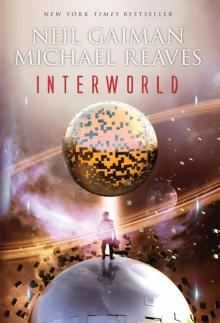 InterWorld
InterWorld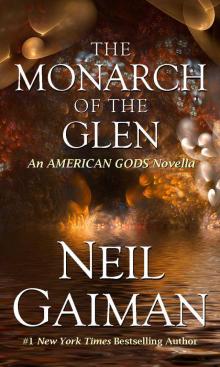 The Monarch of the Glen
The Monarch of the Glen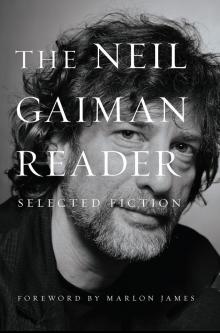 The Neil Gaiman Reader
The Neil Gaiman Reader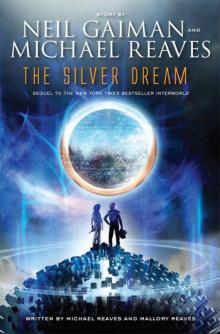 The Silver Dream
The Silver Dream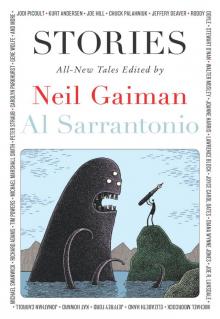 Stories
Stories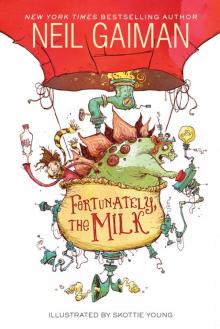 Fortunately, the Milk
Fortunately, the Milk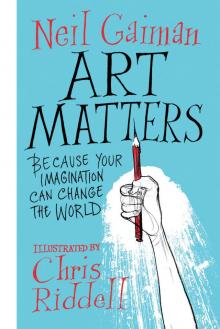 Art Matters
Art Matters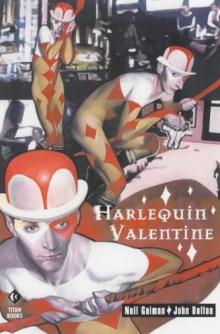 Harlequin Valentine
Harlequin Valentine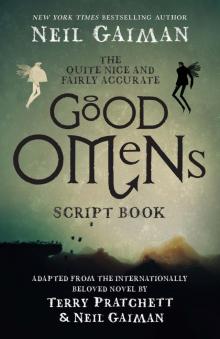 The Quite Nice and Fairly Accurate Good Omens Script Book
The Quite Nice and Fairly Accurate Good Omens Script Book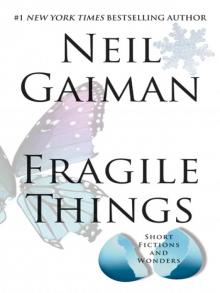 Fragile Things
Fragile Things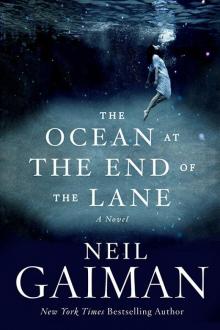 The Ocean at the End of the Lane: A Novel
The Ocean at the End of the Lane: A Novel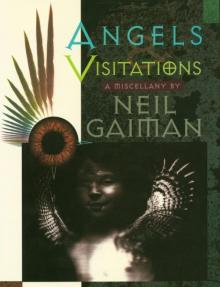 Angels and Visitations
Angels and Visitations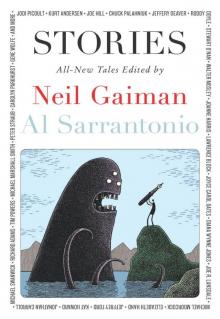 Stories: All-New Tales ngss-1
Stories: All-New Tales ngss-1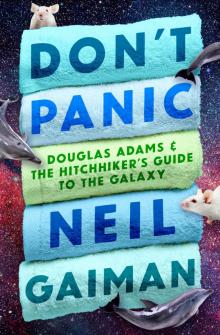 Don't Panic
Don't Panic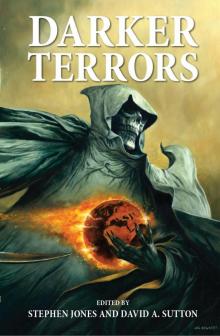 Darker Terrors
Darker Terrors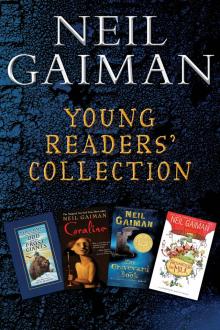 Neil Gaiman Young Readers' Collection
Neil Gaiman Young Readers' Collection A Study In Emerald
A Study In Emerald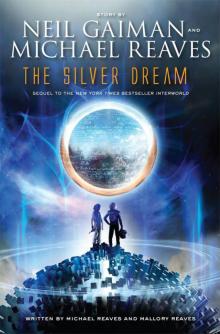 The Silver Dream: An InterWorld Novel
The Silver Dream: An InterWorld Novel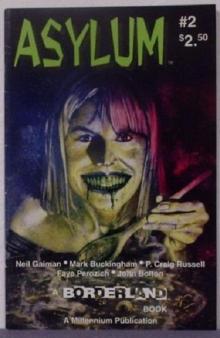 Feeders and Eaters
Feeders and Eaters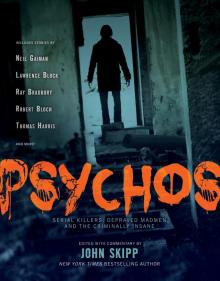 Psychos
Psychos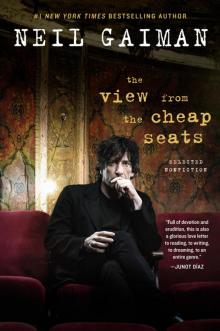 The View from the Cheap Seats
The View from the Cheap Seats Trigger Warning
Trigger Warning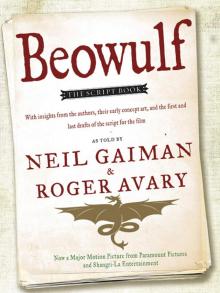 Beowulf
Beowulf Nessun Dove
Nessun Dove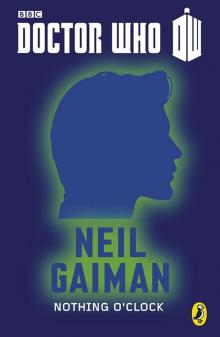 Doctor Who: Nothing O'Clock: Eleventh Doctor: 50th Anniversary
Doctor Who: Nothing O'Clock: Eleventh Doctor: 50th Anniversary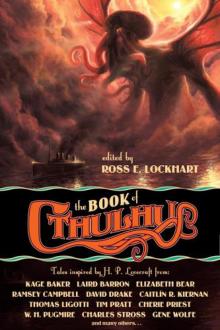 The Book of Cthulhu
The Book of Cthulhu